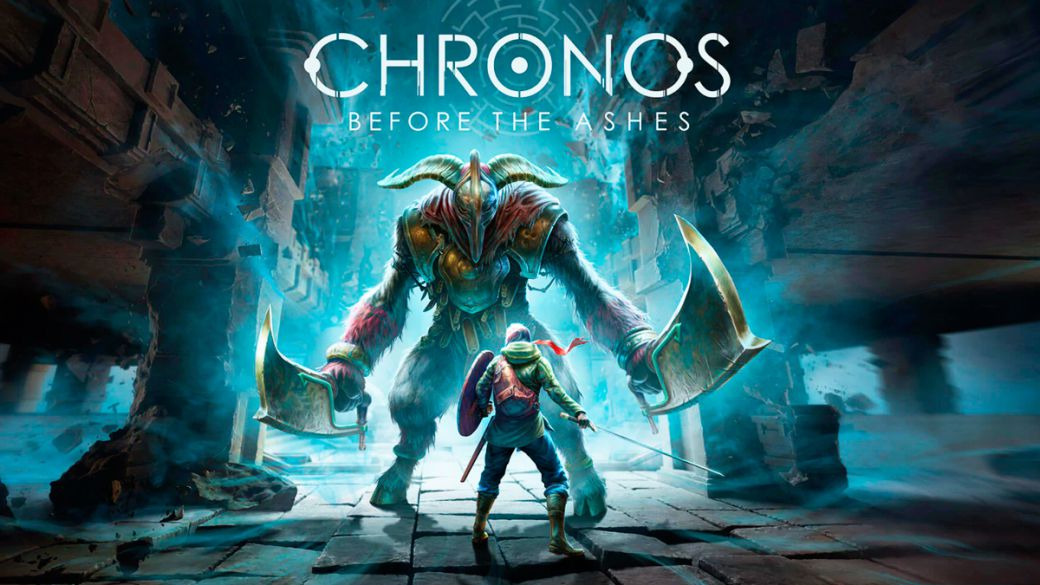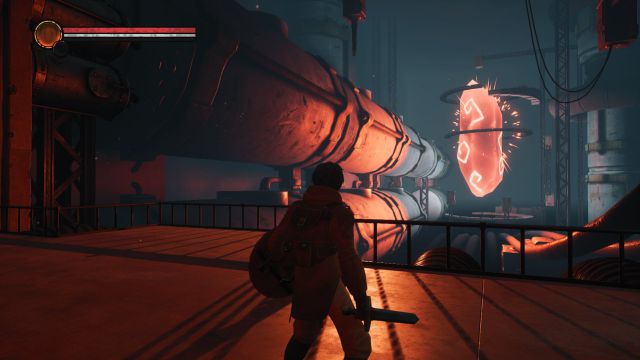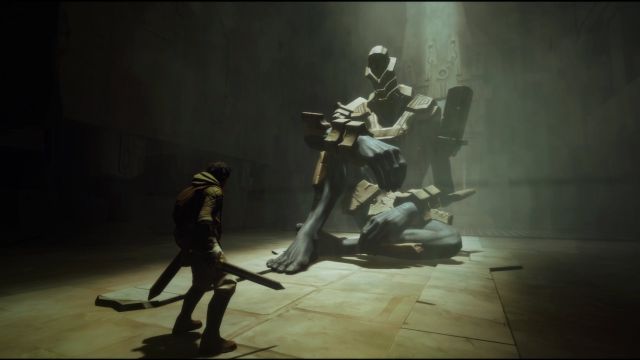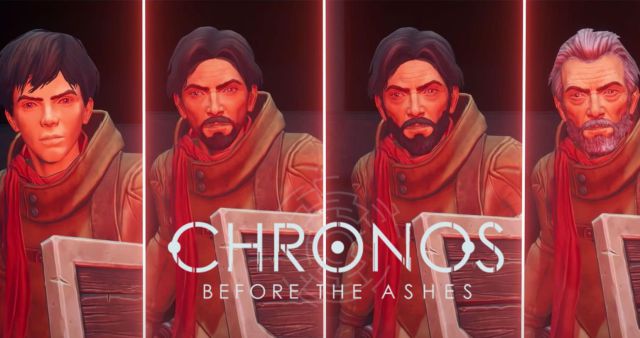
Chronos: Before the Ashes comes to consoles. We analyze the Switch version and reveal its relationship with Remnant from the Ashes. What came first the chicken or the egg?
The old man has revealed our destiny to the tribe. The fire shows on the stone circle the shadows of the evil that threatens us. Armed with a sword, a shield and our innocent and inexperienced twenty years we set out on the journey. The island intimidates when we abandon the old boat on the shore. The darkness of the closed night vanishes for a few seconds before the rays that break the sky, but immediately it takes over our environment again. The wind, the cold, the rain, the fear, nothing can prevent us from giving everything for the survival of our tribe. We enter the cave dug in the mountain, we climb a cement staircase with the help of a metal tube railing illuminated by an electric lamp. It is a bunker that goes deep into the bowels of black stone, and in its rooms, the old-fashioned computers … Wait, wait, an electric lamp, a bunker, computers? But wasn’t this a medieval fantasy?
Ashes Chronos: Before would present a succulent mystery right out of the box if it weren’t surrounded by a couple of important and hyped elements that dilute it. On the one hand, in some media it has been sold to us as a prequel to Remnant: From the Ashes, a game released with surprising success in mid-2019. Developed by Gunfire Games and distributed by THQ Nordic, this is a proposal with a lot of gunplay set in a planet earth destroyed by demons. Up to three characters can collaborate in skirmishes between crumbling skyscrapers and streets swept by dust that winds incessantly through the guts of rusty vehicles. Firearms are the main element of attack, and having companions may be more than necessary to bring down that demon with a huge head that screams with tears at the sky stained with blood.

Since both games are related, the location in a modern era is therefore not a mystery. In Chronos: Before of Ashes we can also see the coincidence in the design of some monsters, the mystical stones that glow orange as a safety sign, a certain air of souls in the general tone … Well, we will return to that last detail later. Let’s go first to the second reveal element. Chronos: Before by Ashes is not a new game. It originally appeared as simply Chronos in 2016 for Oculus VR headsets. The plot surprise narrated in the first paragraph begins to sound like a simple joke compared to all this, right? With the pieces on the board, it’s time to move them to see how they fit together, to see the complete and real figure in front of us.
Setting the record straight: Where does Chronos: Before the Ashes fit in?
Those who enjoyed and still enjoy Remnant: From the Ashes should be careful when approaching Chronos: Before Ashes. The previous character of Chronos removes from the equation that it is a more ambitious game, as is usually the case with the second parts. The center here is Remnant and his pull has been used to rescue Chronos. Under normal conditions, Remnant would be considered a sequel, but these circumstances correctly put the term prequel to Chronos.
And it is evident in Chronos: Before Ashes its dual origin as a 2016 and VR game. Third-person games are not as common in virtual reality as first-person titles. VR, by its very definition, seems to be crying out for our eyes to look around in the scenarios that developers create for us. Chronos was brave in that sense. We also believe that the third person is a way that could be exploited more in virtual reality, since that effect is usually very satisfactory, such as observing a miniature world.
The fact is that the graphic work, although well resolved in terms of design and lighting, is too simple and with little possibility of interaction with the elements of the stage. What does not matter with the helmet on, because everything is focused on the primordial experience of the sensation of presence, in a game to use it is seen as a lack. In 2020 it falls a bit short, and perhaps it is in the Switch version where these buts can go more unnoticed.
The influence of the Souls spirit
We discussed it before last. Ashes Chronos: Before relies heavily on the Souls saga. As soon as we start we realize that the button layout is exactly the same as in Dark Souls. Everything is in its place accompanying those actions that we already know so well: running, rolling, blocking with the shield, fast or powerful cut … Perhaps it would have been good for Chronos to look for something further from the classic From Software. Tracing the controls forces us to compare them directly, and while everything works correctly, the dark magic that surrounds a masterpiece is missing. Because in this particular case it is not enough just to imitate a mechanic, in Souls that mechanic grows to infinity accompanied by its lore. Here we do not feel that greatness, that unfathomable terror, that darkness that penetrates us to the bone. A feature that was valid with the RV helmet on weighs again.
The similarities with Dark Souls go beyond combat as we come across a well-studied level design that paves our way as we advance. The structures advance twisting on themselves, which translates into doors that we manage to open after much progress and that connect us with the first rooms. At this point, that same feeling of tranquility is achieved, of having solved without realizing an invisible puzzle that will make things easier for us.

The aging of our character, a great asset that fails in the narrative
One of the great differentiating points of Chronos: Before The Ashes is that falling in combat means getting old. We do not die before an enemy, we are expelled from the island and a year passes until we can face the challenge again. Mechanically it works well. We return with the accumulated experience, with those levels that we have raised in our previous game and those skills that we have been enhancing. When we are young we can increase the effectiveness of agility and strength, but as we advance those statistics increase their requirements until they stagnate, while the greater magical knowledge takes its place.
The aging process is very interesting because, we could say, it integrates organically into the natural way of playing and the vision we have of life itself. At first we are not so concerned about making a mistake, sacrificing a year for a mistake that we could have avoided, going more crazy. As our avatar begins to wear gray in his hair and accumulate visible wrinkles under his eyes, our perception changes. The fear of not being able to finish the adventure and regret for our irresponsibility and immaturity appears. We begin to act more cautiously because we fear defeat. In addition, every certain number of years completed we unlock special power-ups, so we use more the strategy about what we win or lose.
It all sounds great right? Where does it fail then? We believe that at the narrative level it does not work because of how it has been implemented. You may think that it does not matter so much what counts if the mechanics are fun, and in part you would be right, but this dissonance takes you out of the game, because the trick is revealed and with it the illusion that you are trying to create disappears. We explain ourselves.

When we are struck down we appear on the last save stone. Playable, it would be crazy to place ourselves back on the beach with miles to go, but this obligatory detail gives us the feeling of a normal game, without that special and differentiating touch of the passage of time that we are trying to sell. Nor do we have any information about what happened during that year of waiting, with us, with our people. As in Dark Souls, the enemies appear again in the same place as in our previous encounters. No less than twelve months have passed and there they are again. They are the same dwarves, soldiers and demons in the same place with the same routine. Again the magic is broken. We are facing a clear respawn like the one we find in any other game. And then there are the scenarios. Thirty years may pass that you will not see any change. There are no cobwebs or dust, that table is still in the same place, and that torch, nobody has taken to pick up the cart wheel that someone left lying in the middle of the yard, and in the kitchens and warehouses the same bags remain, the same meat, same fruit. If we could smell it, it should be rotten.
Everything is so in evidence that it is a bit sad for the missed opportunity. The passage of time, which is reflected in the appearance of our avatar and in how we are using the statistics, loses steam because we realize that it is simple makeup. It gives the feeling that it is a game like the others that has tried to sell us something else. If there are no resources for the environment to change little by little or for the enemies to appear in different places, change the focus of the narrative and put those limitations in your favor. We think that something like this would have been solved by changing the focus of the story.
Imagine, it is an island where everything is reset when we are killed, that we return defeated to the last save point but with a curse on our shoulders that makes us age a year in a heartbeat. We try again and again, with our increasing experience we manage to go further and further, but we also feel ours further away, because if we manage to overcome evil, when we return to the village, no one will recognize the man in our wrinkles and battered bones. young man who not so long ago went to sea in that boat. Goodbye to our love that was waiting for us hopefully, hello to our parents who are now several decades away and who will inevitably see their aging son die sooner or later. Don’t you think that this would have been more exciting and that everything would have fit better? It seems that the decisions of a narrative director who more intelligently exploited the interesting playable premise, the polished mechanics and the technical limitations in favor of the final result, have been needed.
CONCLUSION
Chronos: Before the Ashes is a game with good intentions that are spoiled by the most diverse circumstances. Take the Dark Souls controls but it is missing Dark and it is missing Soul; Its origin for virtual reality is too noticeable, which translates into simple scenarios with which there is not much interaction; It is related in prequel form to the successful Remnant: From the Ashes, but its age, its less ambitious character and a gameplay that Remnant users may not like because it offers just the opposite of this (loneliness in the face of cooperative possibilities , melee vs. gunplay …). His main commitment to originality, to grow old instead of dying, works mechanically but makes water at the narrative level: the passage of time remains only as a visible advertising phrase through a progressive change of Skin. It is not a bad game at all, but it would have been better to detach from Remnant and an audience to which it does not appeal, think more about combining mechanics and narrative and be clear with its origin.
THE BEST
- A nice artistic direction
- Some brilliant moments that lead us to the end of phase bosses
- Souls fight tone suits him
- Nice job on lighting
- Its mechanics in which we grow old instead of dying …
WORST
- … that becomes a mirage when colliding with the narrative
- His relationship with Remnant hurts him more than benefits
- The intermittent feeling that it could have been better
Right
It is not the latest or the most original, it does not have the best execution either, but it can be fun if you like the genre. Good, but room for improvement.
